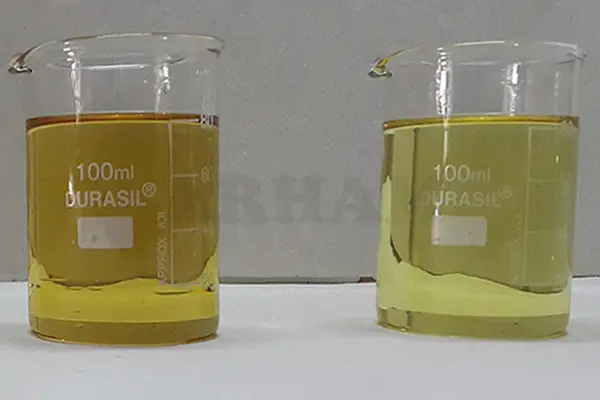Wash oil, also known as scrubbing oil, is heavy, aromatic hydrocarbon oil commonly used in industrial applications, particularly in the petrochemical and coal-processing industries. It plays a crucial role in various processes, primarily absorbing or scrubbing unwanted compounds from gas streams. The oil’s unique properties make it ideal for separating impurities and pollutants from gaseous byproducts in different industrial settings, such as tar, naphthalene, and other organic compounds.

1. Composition and Characteristics of Wash Oil
Wash oil is typically composed of aromatic hydrocarbons, which are compounds that contain one or more benzene rings. The high aromatic content is essential because these compounds have the necessary affinity to absorb certain impurities from gases effectively. Aromatic hydrocarbons, such as benzene, toluene, and xylene, are known for their solvency power, which is the ability to dissolve or absorb various organic materials, making wash oil an ideal choice for scrubbing applications.
Wash oil’s high boiling point, viscosity, and stability also contribute to its effectiveness. These properties allow it to remain in liquid form at elevated temperatures, making it suitable for high-temperature gas scrubbing processes. Additionally, wash oil can be recycled and reused after treatment, reducing waste and lowering operational costs.
2. Primary Uses of Wash Oil
The primary purpose of wash oil is to clean gas streams by removing specific impurities, improving gas quality, and preventing fouling in industrial systems. Some of the most common applications of wash oil include:
- Coal Tar Processing: In coal processing, wash oil is often used to clean or scrub gases released during the coking process. During the coking of coal, gases that contain volatile organic compounds (VOCs), tar, and other pollutants are generated. Wash oil is circulated through the gas streams to absorb these impurities, effectively reducing their concentration before the gas is released or further processed.
- Purification of Coke Oven Gas: Coke oven gas, a byproduct of coal carbonization, often contains contaminants like naphthalene, ammonia, and other tar-like substances. If left untreated, these contaminants can damage equipment and lower the quality of the gas. By using wash oil, plants can remove a large portion of these impurities, ensuring that the gas can be safely utilized for other applications or further refined.
- Naphthalene Removal: Naphthalene, a byproduct of coal tar processing, can cause significant problems if it condenses within pipelines and equipment, leading to blockages and reduced efficiency. Wash oil helps dissolve naphthalene, allowing it to be removed from the gas stream and collected separately. This is particularly important in industries where naphthalene is an undesired byproduct or where its buildup can cause operational issues.
- Natural Gas Processing: Wash oil can also be used in natural gas processing to remove certain organic contaminants. Although not as common as in coal processing, wash oil’s properties make it a viable option for absorbing hydrocarbons and impurities in natural gas treatment facilities.
3. Advantages of Using Wash Oil
The use of wash oil in industrial processes offers several benefits:
- Effective Removal of Organic Compounds: Due to its high aromatic content and solvency, wash oil is highly effective in removing tar, naphthalene, and other organic compounds from gas streams. This capability improves gas quality and reduces the need for additional purification steps.
- Reusability: Wash oil can often be recycled and reused in industrial processes, making it a cost-effective choice. Once the oil absorbs the impurities, it can be treated, purified, and recirculated, minimizing waste and lowering operational costs.
- Protecting Equipment and Infrastructure: By removing heavy organic compounds from gas streams, wash oil prevents fouling, corrosion, and blockage in equipment, extending its lifespan and reducing the need for maintenance. This advantage is particularly relevant in industries that deal with high-temperature gases, where solid or sticky byproducts can accumulate and damage processing equipment.
4. Limitations and Considerations
Despite its benefits, there are some limitations to using wash oil in industrial processes. For instance, wash oil can become saturated with impurities over time, requiring periodic regeneration or replacement to maintain its efficiency. In some cases, this regeneration process can be costly and may involve additional equipment and processing steps.
Environmental concerns related to the disposal of spent wash oil also need to be considered. Since it contains absorbed impurities, spent wash oil must be handled and treated carefully to avoid contaminating the environment. Disposal regulations and guidelines must be strictly followed to ensure that hazardous compounds are not released into the ecosystem.
Additionally, the performance of wash oil can be impacted by the temperature and pressure conditions of the gas streams. For optimal results, the properties of the wash oil must match the conditions of the specific process. For instance, if the gas stream has a high tar content, a heavier wash oil might be more suitable, while a lighter oil may be more appropriate for lower concentrations.
5. Future Prospects for Wash Oil
With increasing environmental regulations and the drive for cleaner industrial processes, wash oil technology may continue to evolve. Researchers are exploring ways to enhance the efficiency of wash oil and reduce its environmental footprint by developing advanced regeneration techniques and potentially creating environmentally friendly alternatives.
In addition, industries may seek to modify wash oil formulations to better target specific contaminants or operate under more extreme conditions, such as higher temperatures or pressures. Innovations in these areas could make wash oil an even more versatile and efficient tool in industrial gas scrubbing applications.
Conclusion
Wash oil is a specialized hydrocarbon oil that plays a vital role in cleaning and purifying gas streams across various industries. Its high aromatic content, solvency power, and reusability make it a practical and cost-effective choice for removing impurities like tar, naphthalene, and other organic compounds from gases. While there are some limitations and environmental considerations, wash oil remains a valuable resource for improving gas quality and protecting industrial equipment. As technology advances, the role of wash oil may continue to expand, offering cleaner, more efficient solutions for industrial gas purification.
Post time: 11-11-2024





